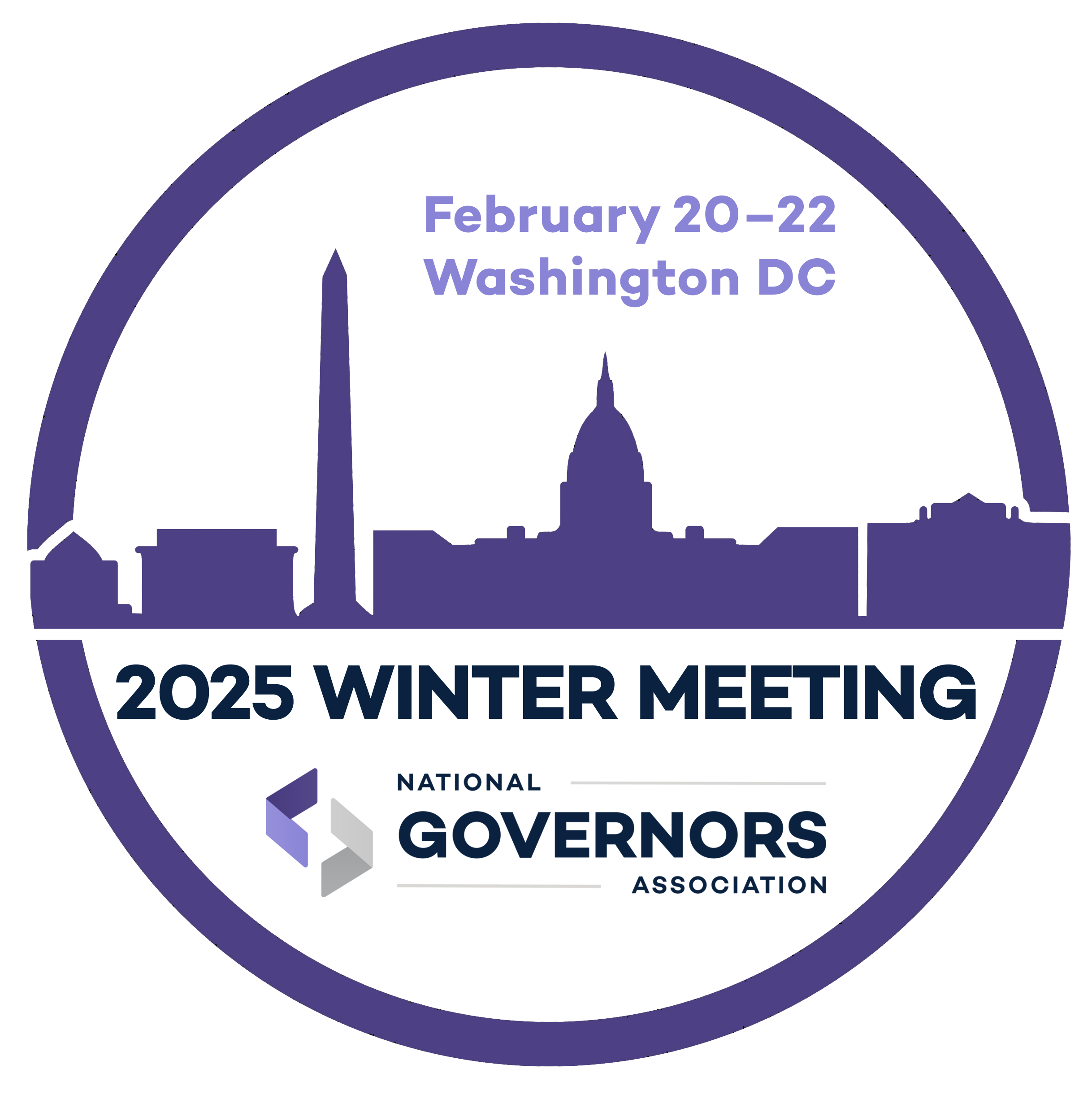Updates from the NGA Membership Team for July 2022. For more about the programs below and a list of upcoming events please email us at: membership@nga.org.
This week, Governors will meet in Portland, Maine, to collaborate on bipartisan solutions to leading policy issues including computer science education/cybersecurity, economic recovery, infrastructure and youth mental health care. Governors attending the 2022 NGA Annual Summer Meeting will join federal officials and leaders from business, education and philanthropy for bipartisan conversations and meetings focused on the top issues in states, commonwealths and territories.
The Summer Meeting will include a plenary session focused on NGA Chairman Arkansas Governor Asa Hutchinson’s Chairman’s Initiative, K-12 Computer Science Education. To date, 45 Governors have signed a Compact to help further the goals of the Chairman’s Initiative. The final Compact and list of signatories will be presented at the Summer Meeting.
The Summer Meeting will also include a plenary session focused on the recovery of travel and tourism economic activity. Dolly Parton will make a virtual appearance to join Governors in a discussion of early childhood literacy efforts, including Parton’s Imagination Library, a program that mails free books to children. The meeting will conclude with the announcement of the next Chairman’s Initiative as well as the announcement of the new Vice Chair and other NGA leadership for 2022 – 2023.
NGA Chairman’s Initiative
To date, 45 Governors have signed NGA Chairman Arkansas Governor Hutchinson’s 2021-2022 NGA Chairman’s Initiative Compact pledging to continue to expand access to K-12 computer science classes for students in their states and territories. The final Compact, including the full list of Governors who have signed the Compact, will be announced during this week’s Summer Meeting.
Under Governor Hutchinson’s leadership, Arkansas has become a national leader in K-12 computer science education. Since 2015, the number of computer science students in Arkansas has jumped from 1,110 to over 13,000 – a 770% increase – while also driving a 1,300% increase in the number of girls and a 700% increase in the number of African-American students enrolled in computer science classes.
Governor Hutchinson first introduced his initiative in October 2021 at the National Press Club, and Governors previously met to discuss the initiative in Bentonville, Ark., in March. Governor Hutchinson will convene the final session of the yearlong initiative at NGA’s Summer Meeting in July 2022.
NGA kicked off the Chairman’s Initiative during a meeting held in Denver in August 2021, and Governor Hutchinson also highlighted his K-12 Computer Science Initiative during the NGA Winter Meeting.

Summit on Cybersecurity
From June 22-24, NGA hosted its Fifth National Summit on State Cybersecurity in Columbus, Ohio. The summit is the only national meeting exclusively focused on state cybersecurity. NGA Chairman Arkansas Governor Asa Hutchinson and Ohio Governor Mike DeWine participated in the summit.
Following the conclusion of the Summit, NGA released the commentary 2022 National Summit On State Cybersecurity. The commentary provides a detailed overview of the summit that brought together Governors’ advisors, chief information officers, chief information security officers, National Guard leaders, state homeland security advisors and private sector partners to explore ongoing cybersecurity challenges and to share ideas for improvements. The summit convened more than 200 leaders from nearly every state and territory to engage in both formal and informal settings on a wide range of issues affecting the states.
In addition to providing an analysis of the cybersecurity summit, the commentary also shares video of Governor Hutchinson answering questions about the importance of cybersecurity.
Governors Start Bipartisan Working Group
On June 22, NGA convened the first meeting of a bipartisan working group that will study and make recommendations designed to combat gun violence and provide families confidence in the safety of their communities, and in particular, their schools.
NGA released the following statement regarding the meeting:
“Today, NGA Chairman Arkansas Governor Asa Hutchinson and NGA Vice Chairman New Jersey Governor Phil Murphy convened the first meeting of the working group on School and Community Safety to build upon and work with the Administration and Congress after enactment of the Bipartisan Safer Communities Act, one month after the tragic shooting at Robb Elementary School in Uvalde, Texas.
“This bipartisan law will deliver critical resources to our states and territories. Governors stand ready to work alongside our federal partners, schools and local communities to ensure the Bipartisan Safer Communities Act is successful in reducing gun violence and improving mental health services.”
Governors Hutchinson and Murphy wrote to President Biden June 9 advising him on the establishment of the bipartisan working group.
The following Governors will participate in the working group on behalf of all 55 states and territories:
- Governor Asa Hutchinson (AR)
- Governor Phil Murphy (NJ)
- Governor Spencer Cox (UT)
- Governor Larry Hogan (MD)
- Governor Kathy Hochul (NY)
- Governor Ned Lamont (CT)
- Governor Henry McMaster (SC)
- Governor Gretchen Whitmer (MI)
Government Relations
Governors Urged Quick Action on the Bipartisan Keep Kids Fed Act
On June 23, NGA’s Community Renewal Task Force Co-Chairs Governors Mike Parson and Albert Bryan, Jr. released a statement on the bipartisan Keep Kids Fed Act that was introduced by Senate Agriculture Chairwoman Debbie Stabenow and Ranking Member John Boozman and House Education and Labor Chairman Bobby Scott and Ranking Member Virginia Foxx.
The statement reads: “We are pleased that the bipartisan Keep Kids Fed Act has been introduced to support access to summer meals, allow children who are eligible to receive reduced-price school meals to receive free school meals, and streamline access to healthy meals for children in family child care. If Congress does not act before June 30, these USDA waivers will expire. Many of our schools across the country are still facing challenges, and this temporary extension will provide support to deal with ongoing food service issues. We urge Congress to act swiftly and pass this legislation.”
President Biden signed the Keep Kids Fed Act on June 25.
NGA Summits Comments on Wagner-Peyser Act NPRM
NGA submitted comments expressing opposition to certain aspects of the U.S. Department of Labor’s Employment and Training Administration (DOL-ETA) Wagner-Peyser Act Staffing Notice of Proposed Rulemaking (NPRM). The DOL-ETA NPRM proposes eliminating Wagner-Peyser Act employment services (ES) staffing flexibility for states, including the revocation of ES flexibility granted to Colorado, Michigan and Massachusetts in the 1990s and the revocation of flexibility granted to Missouri and Delaware, which was made available when the Wagner-Peyser Act Staffing Flexibility rule went into effect in February 2020. The NPRM also calls for cross training ES staff to process unemployment insurance (UI) claims and assist UI claimants during times of high unemployment.
The Community Renewal Task Force led the effort, and NGA submitted comments urging DOL-ETA to “preserve the longstanding staffing flexibility afforded to Colorado, Michigan and Massachusetts since the 1990s” and “grandfather in Delaware and Missouri, each of whom have been approved to use non-State merit staff since the final rule for Wagner-Peyser Act Staffing Flexibility went into effect in 2020.” The comment letter also calls on DOL-ETA to reconsider the requirement to cross-train ES staff to carry out UI processing, raising concerns that, while well-intentioned, the change could have unintended consequences for unemployed workers by pulling ES staff off their primary job functions to get workers back into the workforce, while also amounting to an unfunded mandate on states.
Governors Cooper and DeWine Highlight Need for States to Prioritize Cybersecurity
Coinciding with NGA’s National Summit on State Cybersecurity, North Carolina Governor Roy Cooper and Ohio Governor Mike DeWine wrote an opinion piece published in The Columbus Dispatch focused on the need to take action to address the increasing number of cyberattacks occurring across the country.
“As Governors prioritizing cybersecurity in our states, we welcome the chance to collaborate on bipartisan solutions,” write Governors Cooper and DeWine. “The need for action has never been more urgent. Even before Russia’s invasion of Ukraine raised cyber threat levels, ransomware attacks – in which hackers demand payment to retrieve access to data and systems – jumped 78% between 2020 and 2021, according to cybersecurity analysts. Attacks on schools, health care, and federal, state and local government agencies have skyrocketed, accounting for more than 2,300 incidents in 2020.”
In the piece, the Governors highlight the critical role states play in finding creative ways to address the serious challenges cyber attacks pose, including through efforts to ensure states have the workforce needed to address current and future cybersecurity incidents.
“From governments to businesses to individuals, we all have a role to play in cybersecurity. And coordination – between the public and private sectors, and among federal, state and local governments – is critical,” the Governors write. “We need workers for these efforts, and that’s where students, parents, and schools come in. The U.S. is facing a shortage in cybersecurity talent, with thousands of well-paying positions going unfilled. That’s why many states, including ours, are prioritizing computer science and cybersecurity education. It’s a win-win – equipping our residents with skills to succeed and boosting both our economy and cybersecurity capabilities.”

NGA Activities
NGA Holds State Trauma and Resilience Network Convening
The NGA Center for Best Practices and the National Academy of State Health Policy (NASHP) hosted the State Trauma and Resilience Network at the Hall of the States in Washington, D.C. The states in attendance included Delaware, Maryland, North Carolina, Pennsylvania, Virginia and Wisconsin. The group gathered to discuss state strategies to further trauma-informed approaches to state policies. Participants had a chance to hear from federal partners from the Centers for Disease Control and Prevention and the Office of U.S. Surgeon General on opportunities for state-federal collaboration to address Adverse Childhood Experiences (ACEs) and trauma. The group also heard about strategies to integrate trauma-informed care into the court systems and explored innovative approaches on trauma-reduction through intentional design of public spaces. The group discussed a shared definition of resilience and reviewed challenges and opportunities to promote trauma-informed care with their peers.
The State Trauma and Resilience Network is comprised of senior state leaders focused on addressing ACEs, trauma and resilience in their states. The Network grew out of the multi-state technical assistance project on statewide approaches to address ACEs that was convened by the NGA Center for Best Practices and the National Academy for State Health Policy (NASHP). This project ran from July 2020 through August 2021 and included Delaware, Maryland, Pennsylvania, Virginia and Wyoming. This work culminated in the State Actions to Prevent and Mitigate Adverse Childhood Experiences publication. After the multi-state project, a group of states in the mid-Atlantic region began meeting monthly to learn from one another and continue the conversation around ACEs. The group recently evolved into the State Trauma and Resilience Network to include additional states outside the region.
NGA Releases Commentary on Broadband, Workforce Innovation and Digital Equity
NGA has released the commentary Governors Implement: Broadband, Workforce Innovation and Digital Equity to coincide with the Broadband, Workforce Innovation & Digital Equity Summit (B-WIDE) NGA hosted in New Orleans June 15-17.
The commentary provides more details about the summit in New Orleans as well as information about Governors’ work on broadband. The piece focuses on NGA’s work to support Governors as they work toward building capacity for workforce system innovation and developing policy solutions that yield tangible improvements in employment and workforce outcomes, and the piece details the achievements of several states.
NGA Releases Digital Equity Act Guide
NGA released Leveraging The Digital Equity Act To Advance Digital Skills. The guide offers three key strategies and guiding questions for employers to contribute to Digital Equity Act planning and implementation, as well as strategies for state policymakers to support and collaborate with employers in exploring these key questions.
NGA Publication on State Strategies to Manage and Prevent HIV, Viral Hepatitis, STDs and TB
The NGA Center for Best Practices Public Health Team released a new publication, Maximizing Impact: State Strategies to Manage and Prevent HIV, Viral Hepatitis, STDs and TB. Over the last eight months, NGA has conducted interviews, reviewed research and hosted a roundtable to share state and expert strategies associated with addressing HIV, viral hepatitis, STDs and TB through testing and treatment in high impact settings. High impact settings are those where people who are disproportionately more likely to engage in behaviors that increase the risk of acquiring or transmitting an infectious disease often frequent, including syringe services and other harm reduction programs, clinics, emergency departments, jails, prisons and shelters for people experiencing homelessness. The publication discusses how Governors can leverage these settings to connect people to infectious disease prevention, screening and treatment when necessary while also meeting people where they are and removing unnecessary barriers to care.
NGA Leads Infrastructure Coordinators Workshop
NGA’s Center for Best Practices hosted the Second Governors’ Infrastructure Coordinators Workshop in Washington, D.C. from June 26-28. In coordination with SelectUSA, Governors’ infrastructure coordinators and advisors gathered with public and private sector stakeholders, federal agency leads and each other to learn more about implementing the Infrastructure Investment and Jobs Act, including responding to funding opportunities, workforce issues, cross-agency collaboration and local engagement.
NGA Releases Resource on Medications for Opioid Use Disorder Treatment
NGA released the publication Expanding Access to Medications for Opioid Use Disorder Treatment for Justice-Involved Populations Under Community Supervision: Best Practices From Four States to highlight some of the best practices states have identified to improve the medication for opioid use disorder landscape for justice-involved populations.
The publication follows a state workshop launched in July 2021. NGA, American Correctional Association (ACA) and Justice System Partners (JSP) launched the workshop and technical assistance opportunity to provide Governors’ policy advisors, senior correctional administrators, community supervision agency heads, state behavioral health and Medicaid leaders, and senior state public health and public safety officials with best practices and training. The workshop aimed to provide technical assistance related to increasing connections to, and continuity of, treatment services for justice-involved individuals, including medication for opioid use disorder (MOUD), to improve health and safety outcomes in the community.
Alaska, Maryland, Tennessee and Virginia were competitively selected to engage in strategic planning to strengthen health and substance use treatment services for justice-involved populations on community supervision. States discovered a variety of policy and programmatic approaches to improve the MOUD landscape. States were able to pilot interagency collaborations, launch training and education curricula and explore innovative solutions around screening, treatments and case management. The work of these states is highlighted in the publication.
NGA Releases Commentary Exploring Governors’ Work on Criminal Justice and Public Safety Priorities
NGA released the commentary State of the State: Criminal Justice and Public Safety Priorities. The commentary explores how Governors utilized their 2022 State of the State addresses to discuss several ongoing and developing issues concerning criminal justice and public safety, including the recent increase in violent crime and the continued rise in drug overdoses. Governors highlighted four priority areas for the year ahead: increasing support for law enforcement and first responders, continuing support for substance use treatment, reducing violent crime and implementing criminal justice reform.
NGA Releases One-Stop Shop Portals to Help Businesses Navigate State Regulations Publication
NGA released the publication One-Stop Portals Help Businesses Navigate State Regulations. This new paper highlights actions states have taken to create one-stop online hubs for business needs, with an emphasis on those designed to remove barriers and provide a streamlined pathway for people establishing new businesses. Focusing on streamlining and improving business regulatory processes became even more important than before the COVID-19 pandemic. During the pandemic, states quickly began making unexpected, but necessary, regulatory changes to support their business sectors through the economic crisis.
A Day in History
July 9, 2021: NGA announced Arkansas Governor Asa Hutchinson was elected Chairman of the National Governors Association and New Jersey Governor Phil Murphy was elected Vice Chairman. In addition to Governors Hutchinson and Murphy, the following Governors were elected to positions on the NGA Executive Committee, which guides NGA’s operations and priorities:
- Governor Kay Ivey, Alabama;
- Governor Doug Ducey, Arizona;
- Governor Jared Polis, Colorado;
- Governor Charlie Baker, Massachusetts;
- Governor Gretchen Whitmer, Michigan and
- Governor Michelle Lujan Grisham, New Mexico.
NGA maintains a list noting past Chairs and their initiatives.

Membership Programs
Water Cooler Meetings Continue
NGA Membership continues to hold virtual Water Cooler conversations as an informal way to connect Governors’ staff members to learn, discuss and share best practices with their colleagues from across the country.
On June 16, NGA Membership hosted Governors’ constituent services and correspondence staff (CCS).
Upcoming Water Cooler dates for additional groups will be shared in the coming weeks. Individuals interested in learning more about these virtual meetings or proposing a topic to discuss are encouraged to contact the Membership team.
Cybersecurity Policy Advisors Network Resumes
NGA has renewed the NGA Governors’ Cybersecurity Policy Advisors Network. Moving forward, Governors’ offices are invited to designate a representative to participate in this network. This individual could be a policy advisor in the Governor’s office who handles the Governor’s cybersecurity portfolio, a cybersecurity advisor, a cybersecurity office/division director or another official of the office’s choosing. The intent is to select a representative who can speak to the Governor’s cybersecurity priorities. An office may also choose to designate more than one representative.
This network will serve as a forum to share ideas and troubleshoot challenges with colleagues from other states and territories, connect advisors with valuable resources and materials, and provide opportunities to hear from subject-matter experts via periodic webinars and workshops. As the network expands, NGA plans to host regular calls to facilitate timely discussions. Designated participants can be sent to the Membership Program Director.













